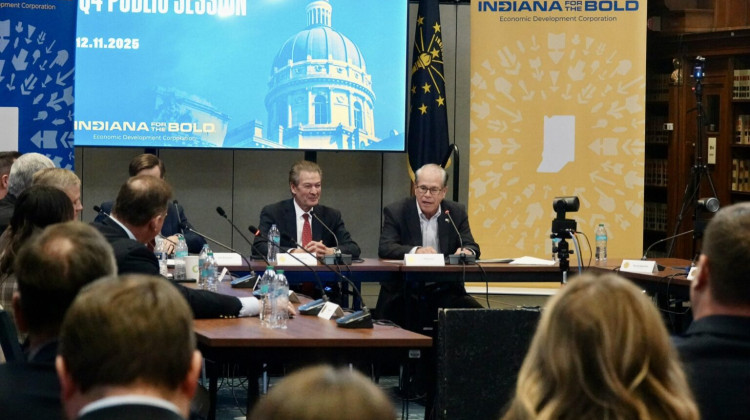
Democrats Marc Carmichael and Dr. Valarie McCray are on the primary ticket in the 2024 race for Indiana’s open U.S. Senate seat.
Photo illustration by Casey Smith / Indiana Capital Chronicle; Photos from campaign websites for Carmichael and McCrayThird District Congressman Jim Banks has been running for the Senate like he has an opponent, and primary voters on May 7 will give him one.
Two Democrats want the nomination — Marc Carmichael and Dr. Valerie McCray — both of whom said that reinstating abortion rights and tackling ongoing immigration issues are among their top priorities, if elected.
Still, it’s been more than a decade since Hoosiers sent a Democrat, Joe Donnelly, to the U.S. Senate.
McCray, a clinical psychologist, is championing mental and reproductive healthcare, emphasizing that her work in the field, as well as her “personal and up close experiences as a female,” make her best suited to tackle policy solutions on those topics.
A former state lawmaker and longtime lobbyist, Carmichael said he’s looking to model himself after Indiana’s senior U.S. Sen. Todd Young and find bipartisan solutions to issues affecting Hoosiers.
“My whole political career I spent working with Republicans, making friendships with Republicans that I’ve maintained to this day, and I think we’ve got to get back to that if we’re ever going to get things done and quit these culture wars that we have now,” Carmichael said. “I just do not want someone out of that ‘chaos caucus’ in the U.S. House, like Banks, to be my United States senator. That means I’ve got to run.”
Banks, a GOP favorite who has already spent nearly eight years in Congress, has a multimillion-dollar campaign war chest and an endorsement from former President Donald Trump. Even so, both Democratic contenders said they’re confident they could win over Banks in this November’s general election. Hoosiers, they said, are looking for someone more moderate and less “extreme.”
“I think Jim Banks is focused on divisive issues. How do we round people up? How do we make them angry? How do we make them feel that someone else is getting something that they are not, that somehow they’re being shorted?” McCray said. “There is, I believe, so many more commonalities among people. I can unite all these groups, regardless of whatever their political signage is.”
Banks is unopposed in the Republican primary after Seymour egg farmer John Rust was removed due to Indiana’s two-primary rule. Also confirmed on this fall’s general election ballot is Libertarian Andrew Horning, who was selected as the party’s candidate during its annual convention last month.
The Senate seat is being vacated by Republican Mike Braun, who is currently vying for the GOP nomination in Indiana’s gubernatorial race.
‘Uniting’ Hoosiers and increasing healthcare access
McCray first launched a Senate campaign two years ago. She didn’t get enough voter signatures to make it on the ballot, however, calling the signature campaign “a horrendous, complicated task.”
But this time around, McCray said her grassroots team was “relentless,” having learned from past runs “how not to get distracted and where to go for signatures.” She reached the 4,500 signatures needed “with time to spare.”
Federal campaign finance data shows Carmichael raised nearly $112,000 through mid-April. McCray has raised a little more than $14,000. Banks has raised more than $4.1 million this election cycle so far. There are no federal reports on Horning’s Senate fundraising as of mid-April.
“Every time I do these campaigns, it’s a financial sacrifice for me. It leaves me struggling, usually. And then I have to get into gear to make that up,” said McCray, who also ran a brief campaign for president in 2020. “But I’m thankful for that process because it makes me remember what my constituents are going through.”
She was working within several Indiana prisons when she initially made the decision to seek federal office.
“So many things I was seeing in there were going wrong,” McCray said, in part pointing to mistreatment of transgender inmates. “We need someone in office that is really sensitive to these issues — that are sensitive to the mental health issues.”
Although immigration isn’t “top of the list” for McCray, she said “it gets in the way of things that should be … like our schools and our medical care system, and addressing climate change.”
“In Indiana, we need migrant workers to help with our farming, to help with some of the infrastructure things — we’re using these people to get our economy rolling. But yet, still, we have this conversation that is so negative,” she said. “Immigration is important for me because it’s in the way of reasonable conversations to get the whole society going. Let’s speed up the process to make sure that people are safe coming over … and let’s move onto other things.”
McCray said the “Israeli-Palestine issue” is among those other topics.
“What’s going on now feels cruel, one-sided. It feels like we’re not holding the values of both people equally,” she said. “It would have been so nice to get a two state solution. I don’t know if we can go back to that. My goal is to make sure that we can try to heal that situation and find a solution. But in the meantime, we’re not going to be able to find a solution if we don’t stop the killing.”
Seeking return to elected office
Although retired from politics, Carmichael said he was compelled to run for the open Senate seat after the U.S. Supreme Court overturned Roe v. Wade in 2022.
“I have four granddaughters … and now, they don’t have the same rights that their moms and their grandmothers had for 50 years,” he said. “I’ve got to do something about that.”
Carmichael said his Indiana Statehouse resumé is a testament to what he can accomplish in Congress. He additionally pointed to his first race for the Indiana House in 1986, when he was up against J. Roberts Dailey, then the Republican House Speaker.
“He was sitting in a 60% Republican district, and no one thought that I could beat him. Starting in July with a cheap little brochure, I went door to door because I didn’t have any money, but I had the time after work. I would spend a couple of hours each evening in the precincts, handing out that brochure and getting to know people,” Carmichael said. His shoe leather campaigning helped him secure an 18-point margin — “a huge upset” — over Dailey that fall.
“The perception is that statewide in Indiana, Democrats can’t win. And yet I’ve been in that situation before, and I know the only thing you can do is just work and go places and meet people and make speeches,” Carmichael continued. “I know what’s ahead of me. I know how to do that.”
In the U.S. Senate, he would quickly seek to work on banning the sale of assault weapons, requiring universal background checks for those purchasing firearms and enacting a national “red flag” law to ensure guns don’t end up in the wrong hands.
“We need to try and do what we can to affect gun violence and mass shootings that occur and are enabled by the purchase of assault weapons,” Carmichael said.
“Immediate action on global warming” is also high on his to-do list, along with affordable housing, especially in rural regions, and a “Medicare for All” plan, so “everyone has access to medical care — especially our our LGBTQ youth, who are being used as political pawns by rightwing Republican legislatures.”
With the Democratic nominees for president and governor already effectively secured, Carmichael said he’s hoping that Democrats still show up for the primary and cast their votes in the Senate race.
“I want to defend our democracy against Trumpism. Banks is a Trumper, through and through, and I just can’t imagine how bad things could get if Trump and Banks were elected at the same time, along with Braun and (Indiana Attorney General) Todd Rokita,” Carmichael said.
“This is a campaign that is going to be dominated by women and people who support women coming out to vote,” he continued. “If they come out in the way I think they’re going to come out, and if the people who are upset about gun violence come out, and if the people who are upset about global warming come out, and if the people are concerned about our LGBTQ youth come out, and people who are concerned about democracy or housing — if all those groups come out and vote the way I think they’re going to vote, then I think I’ll be just fine.”
 DONATE
DONATE








 Support WFYI. We can't do it without you.
Support WFYI. We can't do it without you.